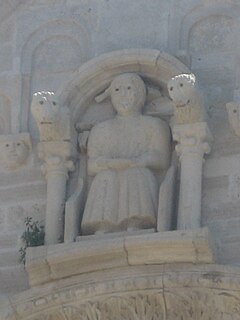
Roger II was King of Sicily and Africa, son of Roger I of Sicily and successor to his brother Simon. He began his rule as Count of Sicily in 1105, became Duke of Apulia and Calabria in 1127, then King of Sicily in 1130 and King of Africa in 1148. By the time of his death at the age of 58, Roger had succeeded in uniting all the Norman conquests in Italy into one kingdom with a strong centralized government.

Roger I, nicknamed Roger Bosso and The Great Count, was a Norman nobleman who became the first Count of Sicily from 1071 to 1101. He was a member of the House of Hauteville, and his descendants in the male line continued to rule Sicily down to 1194.

William I, called the Bad or the Wicked, was the second King of Sicily, ruling from his father's death in 1154 to his own in 1166. He was the fourth son of Roger II and Elvira of Castile.

Roger Borsa was the Norman Duke of Apulia and Calabria and effective ruler of southern Italy from 1085 until his death. He was the son of Robert Guiscard, the conqueror of southern Italy and Sicily; Roger was not as adept as his father, and most of his reign was spent in feudal anarchy.

The Duchy of Amalfi or the Republic of Amalfi was a de facto independent state centered on the Southern Italian city of Amalfi during the 10th and 11th centuries. The city and its territory were originally part of the larger ducatus Neapolitanus, governed by a patrician, but it extracted itself from Byzantine vassalage and first elected a duke in 958. During the 10th and 11th centuries Amalfi was estimated to have a population of 50,000–70,000 people. It rose to become an economic powerhouse, a commercial center whose merchants dominated Mediterranean and Italian trade in IX and X century, before being surpassed and superseded by the other maritime republics of the North, like Pisa, Venice, and Genoa. In 1073, Amalfi lost its independence, falling to Norman invasion and subsequently to Pisa in 1137.

Robert II was the count of Aversa and the prince of Capua from 1127 until his death.

Alfonso, also called Anfuso or Anfusus, was the Prince of Capua from 1135 and Duke of Naples from 1139. He was an Italian-born Norman of the noble Hauteville family. After 1130, when his father Roger became King of Sicily, he was the third in line to the throne; second in line after the death of an older brother in 1138. He was the first Hauteville prince of Capua after his father conquered the principality from the rival Norman Drengot family. He was also the first Norman duke of Naples after the duchy fell vacant on the death of the last Greek duke. He also expanded his family's power northwards, claiming lands also claimed by the Papacy, although he was technically a vassal of the Pope for his principality of Capua.
Tancred of Hauteville, the second son of King Roger II of Sicily and his first wife, Elvira of Castile, was the Prince of Bari and Taranto from 1132 to 1138.
Ranulf II was the count of Alife and Caiazzo, and duke of Apulia. He was a member of the Italo-Norman Drengot family which dominated the Principality of Capua for most of the century between 1050 and 1150. Ranulf's wife, Matilda, was the sister of King Roger II of Sicily.
Roger III was the eldest son of King Roger II of Sicily and Elvira of Castile. He was the Duke of Apulia from 1134 until his death.
The Treaty of Benevento, or Concordat of Benevento, was an important treaty between the papacy of Adrian IV and the Norman Kingdom of Sicily. After years of turbulent relations, the popes finally settled down to a peace with the Hauteville kings.
Robert of Selby was an Englishman, a courtier of Roger II and chancellor of the Kingdom of Sicily. It is likely that his name indicates that he was from Selby in Yorkshire. He probably journeyed to Sicily about 1130. In his train was Thomas Brun.
Henry Aristippus of Calabria, sometimes known as Enericus or Henricus Aristippus, was a religious scholar and the archdeacon of Catania and later chief familiaris of the triumvirate of familiares who replaced the admiral Maio of Bari as chief functionaries of the Kingdom of Sicily in 1161.

Robert of Bassunvilla was the count of Conversano and Loritello. His family had a long history in Vassonville, near Dieppe.

The Hauteville was a Norman family originally of seigneurial rank from the Cotentin. The Hautevilles rose to prominence through their part in the Norman conquest of southern Italy. By 1130, one of their members, Roger II, was made the first King of Sicily. His male-line descendants ruled Sicily until 1194. Some Italian Hautevilles took part in the First Crusade and the founding of the Principality of Antioch (1098).
Guarin was the chaplain and chancellor of Roger II of Sicily from about 1130 to his death, during the first decade of the Norman kingdom of Sicily. According to Alexander of Telese, the contemporary chronicler, he was "erudite ... and most prudent in negotiations ... a cleric well-versed in letters, skillful in matters of the world, and possessed of a tenacious and cautious mind."
Eugenius of Palermo was an amiratus (admiral) of the Kingdom of Sicily in the late twelfth century.

The Norman conquest of southern Italy, also known as The Kingdom In The Sun, lasted from 999 to 1139, involving many battles and independent conquerors.
Jocelyn was an Italo-Norman officer serving Roger II of Sicily.

The County of Apulia and Calabria, later the Duchy of Apulia and Calabria, was a Norman country founded by William of Hauteville in 1042 in the territories of Gargano, Capitanata, Apulia, Vulture, and most of Campania. It became a duchy when Robert Guiscard was raised to the rank of duke by Pope Nicholas II in 1059.